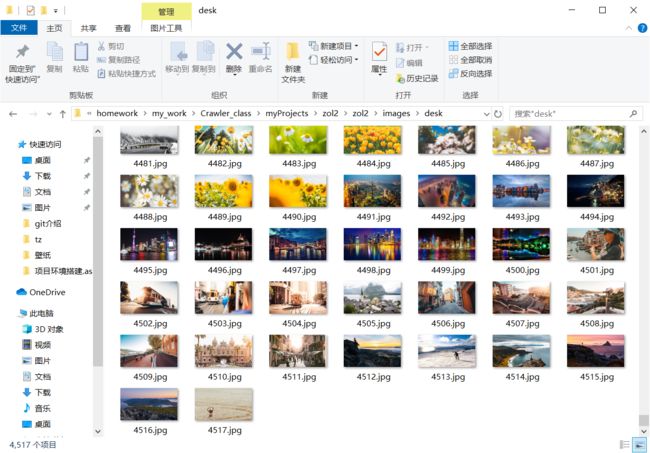使用scrapy框架爬取桌面背景图片
目标数据: zol桌面壁纸,[风景] [1920*1080] 分类下19页每个图册的图片
items.py
import scrapy
class Zol2Item(scrapy.Item):
# define the fields for your item here like:
# name = scrapy.Field()
image_urls = scrapy.Field()
images = scrapy.Field()
image_title = scrapy.Field()pipelines.py
from scrapy import Request
from scrapy.pipelines.images import ImagesPipeline
class ZolPipeline(ImagesPipeline):
# num = 1
def get_media_requests(self, item, info):
image_url = item["image_urls"]
if image_url:
# self.num + 1
yield Request(url=image_url, meta={"item": item})
def file_path(self, request, response=None, info=None):
## start of deprecation warning block (can be removed in the future)
def _warn():
from scrapy.exceptions import ScrapyDeprecationWarning
import warnings
warnings.warn('ImagesPipeline.image_key(url) and file_key(url) methods are deprecated, '
'please use file_path(request, response=None, info=None) instead',
category=ScrapyDeprecationWarning, stacklevel=1)
# check if called from image_key or file_key with url as first argument
if not isinstance(request, Request):
_warn()
url = request
else:
url = request.url
# detect if file_key() or image_key() methods have been overridden
if not hasattr(self.file_key, '_base'):
_warn()
return self.file_key(url)
elif not hasattr(self.image_key, '_base'):
_warn()
return self.image_key(url)
## end of deprecation warning block
return 'desk/{}.jpg'.format(request.meta["item"]["image_title"])middlewares.py
from scrapy import signals
from zol2.useragents import agents
class Zol2SpiderMiddleware(object):
# Not all methods need to be defined. If a method is not defined,
# scrapy acts as if the spider middleware does not modify the
# passed objects.
@classmethod
def from_crawler(cls, crawler):
# This method is used by Scrapy to create your spiders.
s = cls()
crawler.signals.connect(s.spider_opened, signal=signals.spider_opened)
return s
def process_spider_input(self, response, spider):
# Called for each response that goes through the spider
# middleware and into the spider.
# Should return None or raise an exception.
return None
def process_spider_output(self, response, result, spider):
# Called with the results returned from the Spider, after
# it has processed the response.
# Must return an iterable of Request, dict or Item objects.
for i in result:
yield i
def process_spider_exception(self, response, exception, spider):
# Called when a spider or process_spider_input() method
# (from other spider middleware) raises an exception.
# Should return either None or an iterable of Response, dict
# or Item objects.
pass
def process_start_requests(self, start_requests, spider):
# Called with the start requests of the spider, and works
# similarly to the process_spider_output() method, except
# that it doesn’t have a response associated.
# Must return only requests (not items).
for r in start_requests:
yield r
def spider_opened(self, spider):
spider.logger.info('Spider opened: %s' % spider.name)
class Zol2DownloaderMiddleware(object):
# Not all methods need to be defined. If a method is not defined,
# scrapy acts as if the downloader middleware does not modify the
# passed objects.
@classmethod
def from_crawler(cls, crawler):
# This method is used by Scrapy to create your spiders.
s = cls()
crawler.signals.connect(s.spider_opened, signal=signals.spider_opened)
return s
def process_request(self, request, spider):
# Called for each request that goes through the downloader
# middleware.
# Must either:
# - return None: continue processing this request
# - or return a Response object
# - or return a Request object
# - or raise IgnoreRequest: process_exception() methods of
# installed downloader middleware will be called
return None
def process_response(self, request, response, spider):
# Called with the response returned from the downloader.
# Must either;
# - return a Response object
# - return a Request object
# - or raise IgnoreRequest
return response
def process_exception(self, request, exception, spider):
# Called when a download handler or a process_request()
# (from other downloader middleware) raises an exception.
# Must either:
# - return None: continue processing this exception
# - return a Response object: stops process_exception() chain
# - return a Request object: stops process_exception() chain
pass
def spider_opened(self, spider):
spider.logger.info('Spider opened: %s' % spider.name)
settings.py
# -*- coding: utf-8 -*-
# Scrapy settings for zol2 project
#
# For simplicity, this file contains only settings considered important or
# commonly used. You can find more settings consulting the documentation:
#
# https://doc.scrapy.org/en/latest/topics/settings.html
# https://doc.scrapy.org/en/latest/topics/downloader-middleware.html
# https://doc.scrapy.org/en/latest/topics/spider-middleware.html
BOT_NAME = 'zol2'
SPIDER_MODULES = ['zol2.spiders']
NEWSPIDER_MODULE = 'zol2.spiders'
# Crawl responsibly by identifying yourself (and your website) on the user-agent
USER_AGENT = 'Mozilla/5.0 (Windows NT 10.0; Win64; x64) AppleWebKit/537.36 (KHTML, like Gecko) Chrome/73.0.3683.75 Safari/537.36'
# Obey robots.txt rules
# ROBOTSTXT_OBEY = True
# Configure maximum concurrent requests performed by Scrapy (default: 16)
#CONCURRENT_REQUESTS = 32
# Configure a delay for requests for the same website (default: 0)
# See https://doc.scrapy.org/en/latest/topics/settings.html#download-delay
# See also autothrottle settings and docs
DOWNLOAD_DELAY = 0.5
# The download delay setting will honor only one of:
#CONCURRENT_REQUESTS_PER_DOMAIN = 16
#CONCURRENT_REQUESTS_PER_IP = 16
# Disable cookies (enabled by default)
#COOKIES_ENABLED = False
# Disable Telnet Console (enabled by default)
#TELNETCONSOLE_ENABLED = False
# Override the default request headers:
#DEFAULT_REQUEST_HEADERS = {
# 'Accept': 'text/html,application/xhtml+xml,application/xml;q=0.9,*/*;q=0.8',
# 'Accept-Language': 'en',
#}
# Enable or disable spider middlewares
# See https://doc.scrapy.org/en/latest/topics/spider-middleware.html
#SPIDER_MIDDLEWARES = {
# 'zol2.middlewares.Zol2SpiderMiddleware': 543,
#}
# Enable or disable downloader middlewares
# See https://doc.scrapy.org/en/latest/topics/downloader-middleware.html
#DOWNLOADER_MIDDLEWARES = {
# 'zol2.middlewares.Zol2DownloaderMiddleware': 543,
#}
# Enable or disable extensions
# See https://doc.scrapy.org/en/latest/topics/extensions.html
#EXTENSIONS = {
# 'scrapy.extensions.telnet.TelnetConsole': None,
#}
# Configure item pipelines
# See https://doc.scrapy.org/en/latest/topics/item-pipeline.html
ITEM_PIPELINES = {
'zol2.pipelines.Zol2Pipeline': 300,
}
IMAGES_STORE = "/home/pyvip/env_spider/zol2/zol2/images"
# Enable and configure the AutoThrottle extension (disabled by default)
# See https://doc.scrapy.org/en/latest/topics/autothrottle.html
#AUTOTHROTTLE_ENABLED = True
# The initial download delay
#AUTOTHROTTLE_START_DELAY = 5
# The maximum download delay to be set in case of high latencies
#AUTOTHROTTLE_MAX_DELAY = 60
# The average number of requests Scrapy should be sending in parallel to
# each remote server
#AUTOTHROTTLE_TARGET_CONCURRENCY = 1.0
# Enable showing throttling stats for every response received:
#AUTOTHROTTLE_DEBUG = False
# Enable and configure HTTP caching (disabled by default)
# See https://doc.scrapy.org/en/latest/topics/downloader-middleware.html#httpcache-middleware-settings
#HTTPCACHE_ENABLED = True
#HTTPCACHE_EXPIRATION_SECS = 0
#HTTPCACHE_DIR = 'httpcache'
#HTTPCACHE_IGNORE_HTTP_CODES = []
#HTTPCACHE_STORAGE = 'scrapy.extensions.httpcache.FilesystemCacheStorage'pazol2.py
# -*- coding: utf-8 -*-
import scrapy
from scrapy.linkextractors import LinkExtractor
from scrapy.spiders import CrawlSpider, Rule
from zol2.items import Zol2Item
class Pazol2Spider(CrawlSpider):
name = 'pazol2'
# allowed_domains = ['desk.zol.com.cn']
start_urls = ['http://desk.zol.com.cn/fengjing/1920x1080/']
front_url = "http://desk.zol.com.cn"
num = 1
rules = (
# 1.解决翻页
Rule(LinkExtractor(allow=r'/fengjing/1920x1080/[0-1]?[0-9]?.html'), callback='parse_album', follow=True),
# 2.进入各个图库的每一张图片页
Rule(LinkExtractor(allow=r'/bizhi/\d+_\d+_\d+.html', restrict_xpaths=("//div[@class='main']/ul[@class='pic-list2 clearfix']/li", "//div[@class='photo-list-box']")), follow=True),
# 3.点击各个图片1920*1080按钮,获得html
Rule(LinkExtractor(allow=r'/showpic/1920x1080_\d+_\d+.html'), callback='get_img', follow=True),
)
def get_img(self, response):
item = Zol2Item()
item['image_urls'] = response.xpath("//body/img[1]/@src").extract_first()
item['image_title'] = str(self.num)
self.num += 1
yield item爬取结果
共爬取了4517张图片,用时108分钟
放在桌面图库,半小时换一张,美滋滋。
